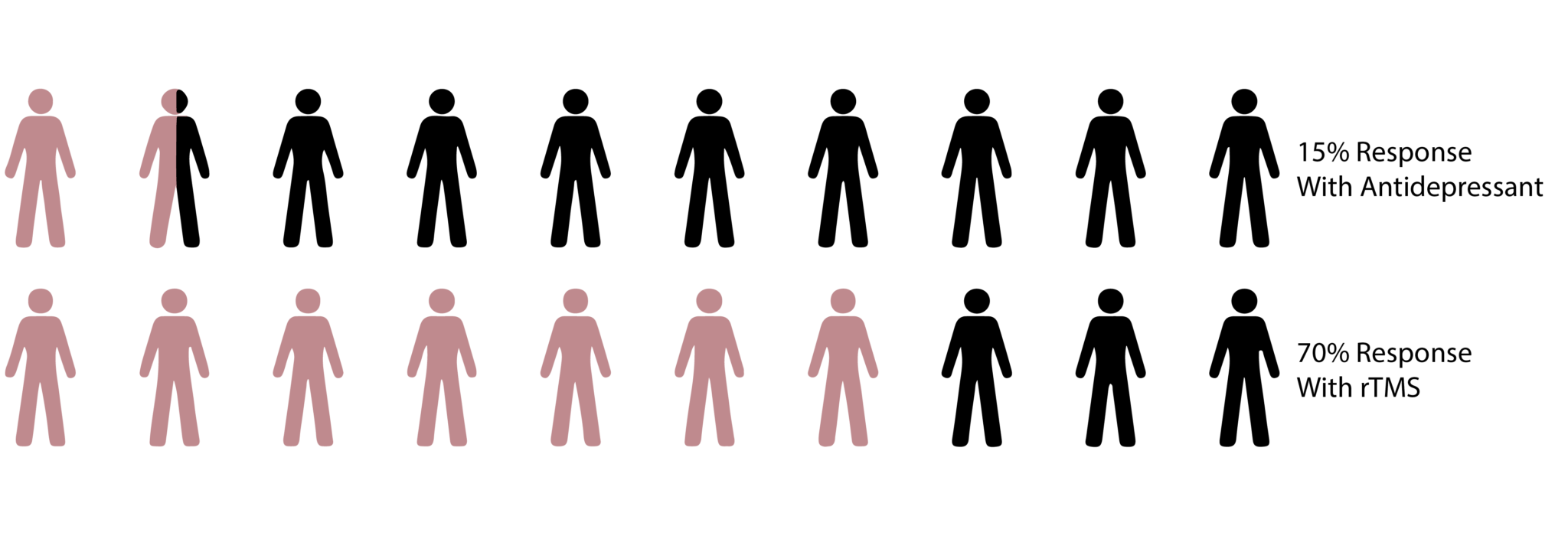Our Treatments
rtms for depression

Depression is a common but serious disorder that can affect your behaviour, thoughts, and feelings. Depression is characterized by persistent feelings of sadness with a loss of interest in activities you once enjoyed. Unfortunately, many patients are treatment-resistant, meaning they have not improved even after trying two antidepressants. At this point, the likelihood of responding to another antidepressant is as low as 15% (1). Fortunately, rTMS is a highly effective option for treatment-resistant depression.
Depression is a multifactorial disease with multiple possible causes, including abnormal mood regulation in the brain, genetic susceptibility, and environmental stress. Specific circuits in the brain which are responsible for mood are believed to be abnormal in patients with depression.
Common treatments for depression include medications such as antidepressants and psychotherapy, including cognitive behavioral therapy (CBT).
There is strong evidence to support the use of rTMS for treatment-resistant depression. Multiple large studies have consistently found rTMS to be an effective treatment (2). A comprehensive review concluded patients with treatment-resistant depression were five times more likely to achieve remission (complete elimination of symptoms) than control (3). Approximately 60% of people with depression will get better with rTMS and 35-40% may find they have no symptoms of depression after treatment (4). rTMS may also increase the efficacy of antidepressants in patients who are not treatment-resistant (4). In addition, combining psychotherapy with rTMS may increase its effectiveness (5).
Repetitive transcranial magnetic stimulation (rTMS) is a non-invasive, highly effective treatment that uses electromagnetic impulses that pass easily through the skull to stimulate abnormal brain activity without any systematic side effects or downtim
- Howland, R. H. (2008). Sequenced Treatment Alternatives to Relieve Depression (STAR* D)–Part 2: Study Outcomes. Journal of psychosocial nursing and mental health services, 46(10), 21-24.
- Holtzheimer, P. 3., Russo, J., & Avery, D. H. (2001). A meta-analysis of repetitive transcranial magnetic stimulation in the treatment of depression. In Database of Abstracts of Reviews of Effects (DARE): Quality-assessed Reviews [Internet]. Centre for Reviews and Dissemination (UK).
- Gaynes, B. N., Lloyd, S. W., Lux, L., Gartlehner, G., Hansen, R. A., Brode, S., … & Lohr, K. N. (2014). Repetitive transcranial magnetic stimulation for treatment-resistant depression: a systematic review and meta-analysis. The Journal of clinical psychiatry, 75(5), 0-0.
- Maneeton, B., Maneeton, N., Woottiluk, P., & Likhitsathian, S. (2020). Repetitive transcranial magnetic stimulation combined with antidepressants for the first episode of major depressive disorder. Current Neuropharmacology, 18(9), 852–860. https://doi.org/10.2174/1570159×18666200221113134
- Donse, L., Padberg, F., Sack, A. T., Rush, A. J., & Arns, M. (2018). Simultaneous RTMS and psychotherapy in major depressive disorder: Clinical outcomes and predictors from a large naturalistic study. Brain Stimulation, 11(2), 337–345. https://doi.org/10.1016/j.brs.2017.11.004
Discover rTMS and its Evidence

